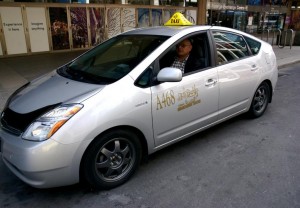New Bylaw makes Enviro News by placing fuel consumption rules on taxis.
City Council in Toronto, Ontario have recently adopted a bylaw that sets high environmental standards applicable to all new taxi cabs in the city. New taxis must be either electric, hybrid, run on biodiesel, or have a fuel efficiency better than seven litres of gas per 100 kilometres (an efficiency requirement that will be revised annually).
Exceptions have been made for designated accessible taxis as there are no cabs on the market that meet both the green standards and the accessibility requirements. Council’s decision to transition the taxi industry to low-emissions or hybrids by 2015 was based on a Toronto Atmospheric Fund pilot project demonstrating that hybrid vehicles could meet all the needs of a cab company while cutting GHG emissions and fuel costs by 24% to 37%. TAF advised the City on the development of the green taxi standards, which support the City’s Climate Change, Clean Air and Sustainable Energy Action Plan.
Once the new standards are fully phased in, GHG emissions will be reduced by approximately 22,000 tonnes annually and the taxi industry will save $12 million yearly in fuel costs.
Passengers arriving in Toronto from its major airport and seeking an airport limousine are also seeing changes to the vehicles being used. In recent months many of the ubiquitous Lincoln Town Cars which have been prevalent among airport limo fleets for so long are now being replaced by Lexus ES300h hybrid sedans.
Toronto’s initiative follows a trend that continues to see taxi fleets in several other major cities facing requirements regarding fuel efficiency. Other cities where hybrid taxis are prevalent include Vancouver, BC, San Francisco, CA and even New York City.


the write is great